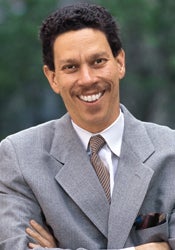Post Date: Novemeber 22, 2005
Professor David Wilkins directs the Program on the Legal Profession and its affiliate, the Center on Lawyers and the Professional Services Industry, at HLS. Here he discusses recent trends and pressures in the profession with staff writer Mary Bridges.
This year, the Center on Lawyers and the Professional Services Industry started a new research-focused phase. What are the central questions the program wants to crack?
It starts from the premise that we are in the midst of a kind of global restructuring of legal and professional services, and we want to understand why it’s happened, how it’s happened, and what its implications are for the legal profession. Here in the United States, law plays a fundamental role in the way in which we structure our lives, and lawyers are key players. To the extent that a fundamental shift is going on, what effect will it have on the profession and our wider political, economic and social lives?
Why is it the job of a law school, rather than a sociology department or a business school, to study that?
One could argue it’s everybody’s responsibility, but my argument would be, it’s particularly the responsibility of a law school, which claims to train people to be lawyers. It’s also the law school’s obligation to those lawyers after they graduate to provide them with unbiased and systematic information on the large questions that are affecting their professional careers and the world in which they live and compete.
I also think law schools have a professional obligation to the multiple consumers of legal services. After all, a license to practice law is something of a monopoly in the United States—at least, you can only become a lawyer if you go to law school. Law schools have an obligation to train lawyers in a way that serves the broader public purposes that lawyers have the privilege to serve.
Where do you see the biggest gap between what law schools teach and what lawyers do now?
The biggest gap stems from the fact that we focus almost entirely on law as an individual practice about individual decision making. But law is increasingly practiced in organizations and institutions of increasingly large and bureaucratic size.
It’s easiest to see this in the world of the large private law firm: In 1965, the largest law firm in the world had about 160 lawyers. Today, 160 lawyers are a Toledo branch office of an Akron law firm. And it’s not just private law firms. If you look at a state prosecutor’s office, a general counsel’s office, the size of a legal services office or a legal clinic, law is increasingly an institutionalized profession, and we teach our students very little about practicing law in an institutional context.
You’ve described two trends in the legal profession—one toward specialization and the other toward expansion and mergers. Do you see one model winning over the other?
Well, I think we don’t know yet. A few years ago it was popular to talk about consolidation and to hypothesize that we would very quickly get to the point where law firms were the size of the major accounting firms. Now we know that many law firm mergers, just like many mergers in general, fail to produce the efficiency gains that the people thought they would.
I think we’re seeing consolidation, but we’re also seeing the proliferation of practice settings. And technology is pushing this, because now you can be sitting in your cabin in New Hampshire and be linked up instantaneously with lawyers in Beijing and investment bankers in Singapore about a project in Rio de Janeiro. Of course, that’s not the norm, but people are experimenting with it, and the more technology allows people to work easily across distance, the more you’re going to see different models developing.
Fall is recruiting season for big law firms coming to HLS. What advice do you have for 3Ls about to dive into this world?
The first thing I’d say is, hopefully you’ve been thinking about this before you were a 3L. But my most important advice is to keep your eyes open and to pay careful attention to what’s happening to your career because nobody really is looking out for you. And if they say they are, they’re mostly being disingenuous.
Law firms have their own set of interests, and one is to hire large numbers of people, because the turnover is so large. Turnover is reaching something like 20 to 25 percent in many law firms, per year. In order to keep the enterprise going, they have to hire very large numbers of people.
How well you do in a law firm depends on what kind of work you get and whether you get what they call in the business school world “stretch” assignments—assignments that challenge you, give you the opportunity to develop higher-order skills and show other people that you know your stuff.
So it’s a world of sharks?
Well, it’s a dangerous world, but it’s also a world filled with opportunity. Law, in many ways, is much more of a meritocracy and is more open today than it ever has been before. And there are even more things that people with good legal training can do to build satisfying and rewarding careers than there were when I got out of law school. A huge number of people now go into investment banking or consulting or work in a major accounting firm or a technology company. I think we’re going to see a renaissance of solo and small-firm practice, because technology allows people to leverage their human capital in ways that were simply impossible before. It’s a very exciting time for students.
